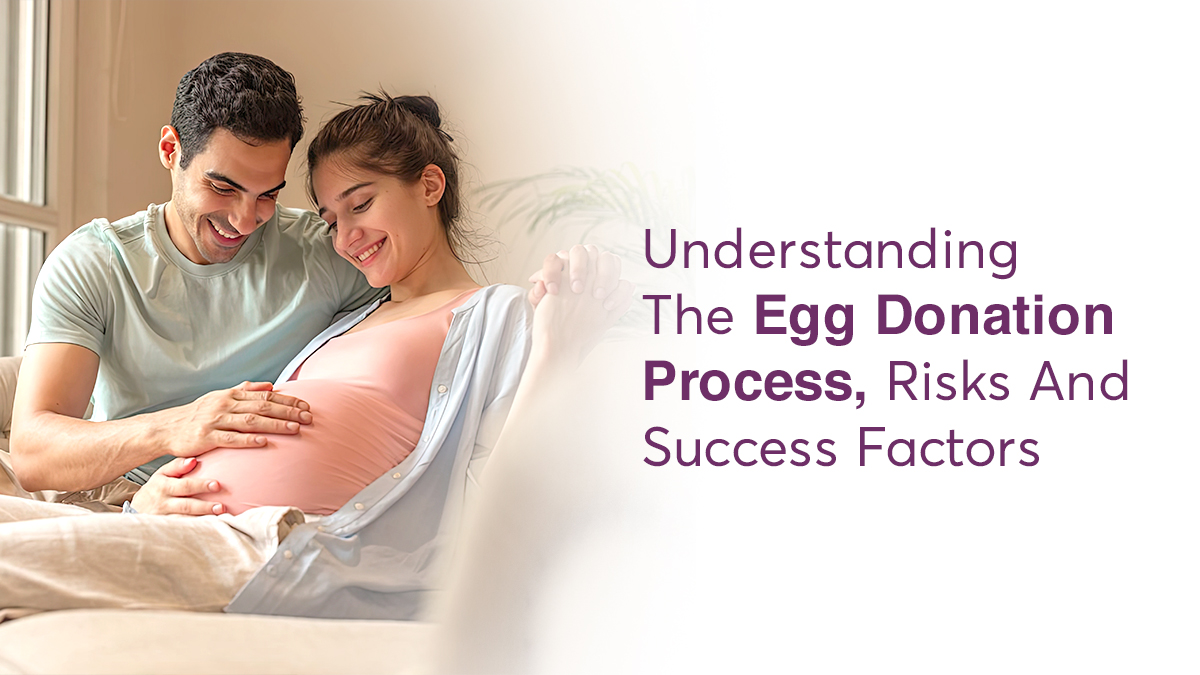The fertility of a woman is impacted by various factors including increasing age, hormonal health, lifestyle and overall reproductive function. With increasing age, the number and quality of eggs reduce, thereby making it tougher for women to conceive naturally as they grow older.
Moreover, conditions like polycystic ovary syndrome (PCOS), endometriosis, and hormonal imbalances can play a role in affecting fertility, particularly egg quality, ovulation or the reproductive environment. Women suffering from fertility challenges may not have the capability to produce eggs of good quality. In such a scenario, egg donation can prove to be an incredible option, allowing women to experience pregnancy and childbirth with the assistance of the donor’s healthy eggs.
What is Egg Donation?
Egg donation is a technique of assisted reproduction in which a woman donates her eggs (oocytes), which are then used to facilitate another female to have a baby. In a few cases, the intended mother carries the embryo created from the donated egg in her own womb, and in other scenarios, a surrogate might be used to carry the embryo. Donor eggs may be merged with the male partner’s sperm or with a donor sperm for fertilisation.
According to research worldwide, on average, approximately 5-24 eggs can be retrieved in an IVF cycle. This amount mainly depends on the health and age of the donor and other guidelines adhered to by the clinic.
Eligibility Criteria for Egg Donors
What are egg donor requirements? Young and healthy women in the 23-35 age are generally considered. Potential donors need to provide a comprehensive family history and go through a medical checkup and tests of the egg reserve to determine whether they are a good fit. If she is deemed to be a good candidate, she will undergo thyroid testing, complete blood count, blood group, blood sugar, thalassemia screening, and infection screening for hepatitis B and C, HIV, and VDRL to rule out syphilis and other evaluation. She might qualify to donate eggs if her reports clear her.
The Process of Egg Donation
Here’s a step-by-step guide to the egg donation process in IVF:
Donor Screening and Matching:
Laboratory tests, psychiatric assessments, family history checks, and physical examinations are all part of the process for egg donors. They are paired with a recipient once they qualify.
Cycle Synchronisation:
Drugs synchronise the cycles of the giver and the recipient. While the donor starts ovarian stimulation, the recipient starts taking medications to get her uterus ready. For some cycle synchronization is not feasible and in these situations frozen embryo transfer cycle is planned.
Egg Retrieval & Fertilisation:
In a laboratory, eggs are extracted while sedated and subsequently fertilised with sperm. The receiver begins taking medicine to support implantation.
Embryo Transfer:
One or two embryos are moved after three to five days. Following that, pregnancy tests are conducted; if they are unsuccessful, frozen embryos may be used in subsequent tries.
Risks Involved with Egg Donation
Is egg donation safe? Although complications can arise, egg donation is usually considered to be safe when overseen by a licensed healthcare provider and does not result in long-term health or fertility problems.
Short-term risks of egg donation for the donors comprise of:
Pregnancy:
If unprotected sexual activity takes place during the medication cycle, there is a high risk of becoming pregnant.
Temporary Weight Gain:
Medications may cause a brief increase in body weight.
Common side effects of medication:
They include nausea, mood swings, bloating, headaches, and exhaustion.
Ovarian Hyperstimulation Syndrome (OHSS):
This rare but deadly condition causes the ovaries to swell, thereby leading to discomfort, nausea and many other symptoms.
Ovarian Torsion:
Rare twisting of the ovaries that may require surgery.
Risk of Infection:
The process of retrieving eggs has the potential to cause infection.
Success Factors in Egg Donation
Age (23-35):
Donors in this age range typically produce more eggs per cycle and have high-quality eggs that react well to treatment.
Good Health:
The quality and quantity of eggs produced in each cycle are greatly influenced by the donor’s general health, which increases the likelihood that IVF will be successful.
Legal and Ethical Considerations
To ensure their legal compliance, donors must undergo thorough medical and psychological testing. These conditions should be spelt out in a formal contract, and they should give their explicit assent after being fully informed. They should also adhere to all the egg donation laws in India. Throughout the egg donation procedure, donors and recipients should feel safe and educated when ethical and legal issues are taken care of.
Emotional and Ethical Aspects of Egg Donation
The egg donation process is a long and challenging journey for both the donors and the recipients. It involves deep emotional as well as ethical considerations, like making sure there is informed consent and fully respecting the autonomy of the donor. Maintaining transparency and practicing sensitivity is important to back the donor’s well-being and honour the hopes of the recipients, thereby encouraging a compassionate and ethical journey for all parties.
When to Consider Egg Donation?
You can opt for egg donation during your IVF process if you’re facing challenges with egg quality, age-related infertility or have other genetic concerns, as it can raise the probability of a successful pregnancy.
Conclusion
If you’re considering egg donation, it is suggested that you do thorough research to comprehend the short-term as well as long-term implications of your decision. Visit an Oasis Fertility Clinic near you where you can discuss your concerns better, as the fertility specialists are equipped with the right skills to guide you better. You can also use the live chat or call 1800-3001-1000 to avail more information.


